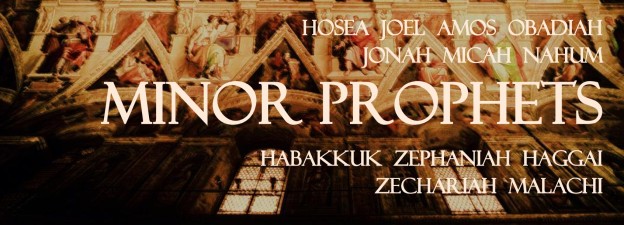"The Day of the Lord" -- Amos 5:1-6:14
 Thursday, April 11, 2019 at 07:46AM
Thursday, April 11, 2019 at 07:46AM 
Sermons on the Minor Prophets: The Book of Amos (4)
Friedrich Nietzsche, the nineteenth century German philosopher, is perhaps best known for his assertion that “God is dead.” A very formidable critic of Christianity, Nietzsche spoke of Christianity as a religion possessing what he called a “slave mentality,” one symptom of which was the putting off of a final judgment until the end of time. This encouraged people to avoid acting authentically in the present. People should not wait for an imaginary God to act, they must decisively act now, freed from religious superstitions. Nietzsche thought Christians foolish (and to be pitied) because advances in science and European culture had rendered the Judeo-Christian God an unworthy explanation of the universe–“God is dead,” a view which many of our contemporaries accept, if only in a practical way. But a Hebrew Prophet named Amos once proclaimed the very doctrine Nietzsche railed against, the true and living God (transcendent and altogether righteous) enters human history at times to bring about his sovereign judgments upon his disobedient people and neighboring Gentile nations–that which the prophets describe as “the Day of the Lord.” We come face to face with the God of the Bible who is very much alive, whether Nietzsche and his followers like him or not.
The “Day of the Lord” is an important theological concept central to the Christian doctrine of a final judgment. Amos, writing about 760 B.C., is the first of the Minor Prophets to call attention to the “Day of the Lord,” but this is a concept found throughout the Minor Prophets, with the exception of the prophet Jonah. When used by Old Testament writers, the term “Day of the Lord” refers those times (often in both the immediate and at the same time distant future) when God decisively intervenes in human history to bring about his righteous judgment upon his people Israel, and then upon Judah, because of their prolonged disobedience and indifference to YHWH’s covenant, their religious hypocrisy and their idolatry. The phrase is also used in connection with God’s judgment upon the Gentile nations which have persecuted God’s people (at times as agents of God’s judgment upon Israel) and who reject God’s own anointed king who comes from the biological line of David–the coming Messiah (Jesus). In these instances, the Day of the Lord points ahead to that future time when God will save a believing remnant of his people Israel, through the same Messiah who, ironically, Israel will reject. The Day of the Lord then can be seen as YHWH meting out covenant curses, and dispensing covenant blessings.
As used throughout the New Testament, the Day of the Lord refers to that final day of human history (judgment day), when Jesus Christ returns to raise the dead, judge the world, and make all things new. It will be a time of cosmic distress when all of creation convulses, and when all men and women will be judged according to what they have done (good or ill). On that day, the Lord will purge away every hint and trace of human sin, creating a new heaven and earth (as we read in 2 Peter 3:10-13–our New Testament lesson), which will be the home of everlasting righteousness, all traces of human sin now removed.
These repeated acts of God in judgment upon his disobedient people and the Gentile nations spoken of throughout the prophets, function as dress rehearsals for that day when Jesus returns at the end of the age. As used throughout the prophets, the Day of the Lord both foreshadows and forewarns God’s people of his righteous judgments upon human sin, the consequences of disobedience to his commandments, and the eternal danger of rejecting his saving mercy both in this life and in the next. At the same time, the Day of the Lord provides an illustration of God’s covenant promise to preserve his people and deliver them from sin and death. Those who know Jesus as their Savior long for his coming–the return of our great God and Savior to usher in our promised inheritance–the resurrection of our bodies and entrance into eternal life.
To read the rest of this sermon: Click Here


Reader Comments